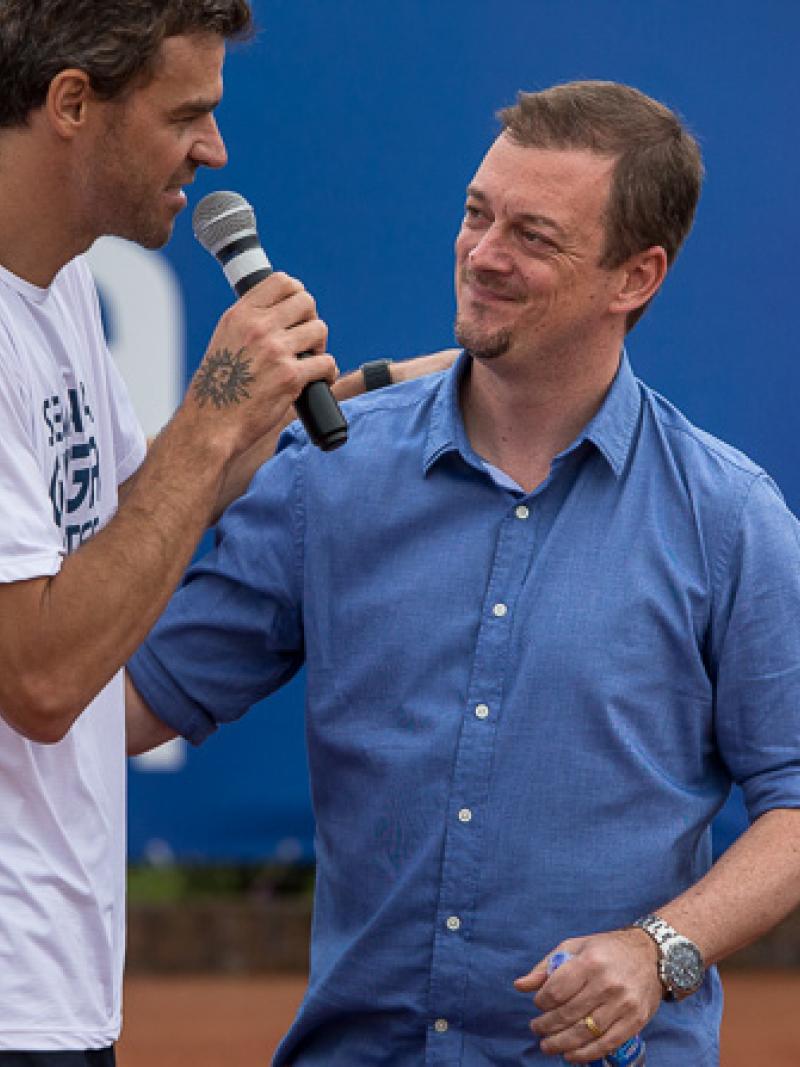Big Interview: Roland Garros champion Gustavo Kuerten
The IPC caught up with former tennis star Gustavo ‘Guga’ Kuerten, an ambassador for the Brazilian Paralympic Committee. 06 Dec 2015
Former tennis player Gustavo Kuerten is the latest ambassador of the Brazilian Paralympic Movement.
"There has been a massive change of perception in Brazil. I have followed this reality since the 1980s ... The reality is absolutely different today."
Three-time Roland Garros champion and former world No. 1 Gustavo Kuerten has been heavily involved in the Paralympic Movement in Brazil. In October, Guga (as he is known by in Brazil) was named the latest ambassador of the Movement for the Brazilian Paralympic Committee (CPB). The announcement coincided with “Guga Kuerten Week” held in Florianopolis, Brazil, where the Copa Guga Kuerten event is held. This year was the fifth year an International Tennis Federation (ITF) sanctioned wheelchair tennis event has been a part of the annual festival.
Paralympic.org: How and why did you get involved in the Paralympic Movement?
Guga: Actually, it naturally happened in my life. Since my brother was born, I had been in touch with a person with a disability. I could perceive the reality of a person with an impairment, understand his challenges and accomplishments. It all taught me a lot and also made me mindful in regard to these aspects of life.
Being connected to sports, thereafter, also contributed. So I can say the Paralympic Movement is something that fascinates me and it is really in my essence. Today, we have more evident actions, like the wheelchair tennis tournament, my institute, but it all started at home with my brother and the simple things of our routines. Every commitment I have concerning this satisfies me a lot.
Paralympic.org: How have you seen perceptions of disability in Brazil change lately with Rio de Janeiro hosting the 2016 Paralympic Games?
Guga: There has been a massive change of perception in Brazil. I have followed this reality since the 1980s, when a disability was perceived almost as an aggression to the society. The reality is absolutely different today. This new approach, especially with para-sports, brings equality, because the athletes are judged due to their high-level of performance.
This level of performance attracts people today. It is a display that goes beyond and transforms the perception of people with impairments and shows what they are capable of.
The turning point, in my opinion, was the London 2012 Paralympics, because all the aspects of an Olympic Games were there. This whole package, the vibration, the emotion, the competition, is what seduces people. Individuals with disabilities today can be themselves. It is not about being good or evil, but being themselves, according to their nature. In my family, we experienced that and today a person with an impairment is able to be as great as any other kid can be.
Paralympic.org: What inspired you to start your own wheelchair tennis event?
Guga: As I said, all the things I went through with my brother and also my career in tennis. The wheelchair tennis tournament also fits in one specific goal of mine, which is to include different elements of this sport in the same place. We promote all the possible activities of tennis, with four-year-old children, 80-year-old adults, the tallest and the shortest kids.
Thus, people in wheelchairs fit in this environment from a provocative perspective as well. I want children to see them playing and think about their greatness, their courage to take part of a tournament like this. Our goal is to keep improving, and who knows? We might become one of the Grand Slams of wheelchair tennis.
Paralympic.org: Aside from wheelchair tennis, what is your favorite para-sport to watch and why?
Guga: I like boccia, football 5-a-side... They are both fascinating. Sitting volleyball as well. Swimming, mainly in Brazil, because of Daniel Dias. So it is hard to choose just one. We promote wheelchair tennis because of my history in that sport, but I'm really addicted to sports in general. No matter if it is Paralympic sport or not, I like them all.
Paralympic.org: As a Paralympic ambassador, how do you plan to promote and support the Games?
Guga: I think the key here is continuity. The 2016 Paralympic Games will bring the spotlight to Brazil, but I think it cannot be limited just to this huge event. We've got to do more, to keep improving so as to daily build something even bigger. It is hard to predict our next steps, where we are going to be. But a couple of years ago, we did not know we would be able to help so many athletes with disabilities who could not get to know sports. We want to keep giving them a chance. So the key word here is continuity. We need to keep being mindful and caring with this task. I'm sure we will accomplish big things moving forward.

 Facebook
Facebook
 Instagram
Instagram
 Twitter
Twitter
 Youtube
Youtube
 TikTok
TikTok
 Newsletter Subscribe
Newsletter Subscribe

